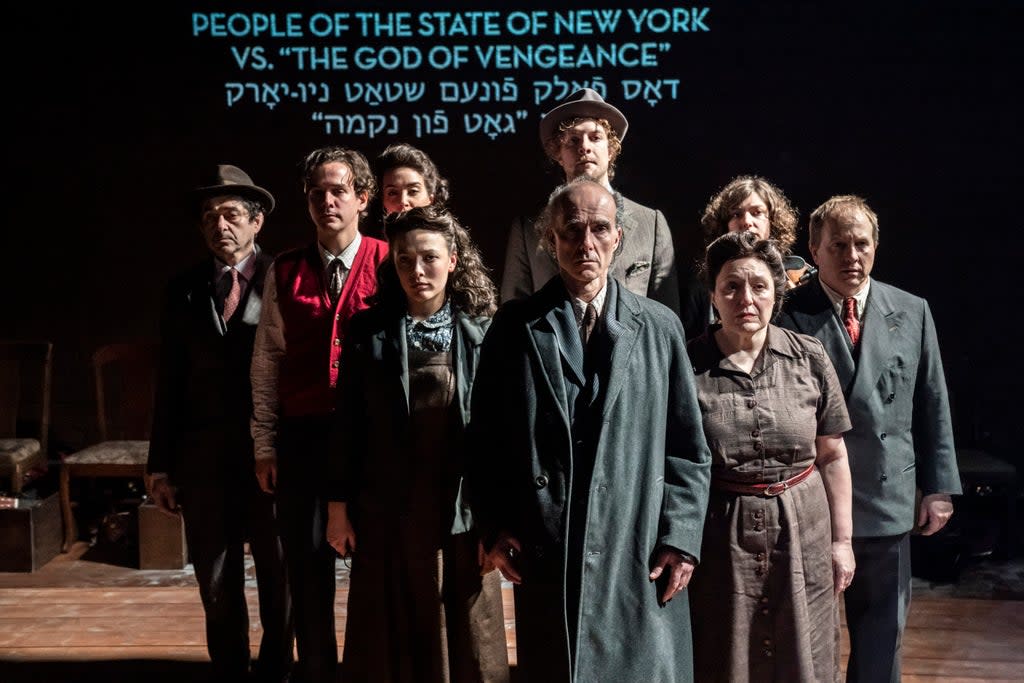Indecent review: An intriguing story that has a lot to teach us

The first lesbian kiss on the Broadway stage occurred in 1923. That’s one of many things I learned from Paula Vogel’s fascinating but overwrought play. Vogel uses the creation and early performance history of Sholem Asch’s Yiddish drama The God of Vengeance to map the experience of European and American Jews in the first half of the 20th century.
Director Rebecca Taichman – who won a Tony for the 2017 New York production – draws moving performances from a tight, seven-strong ensemble backed by a three-piece klezmer band, on a stage bare apart from a gold proscenium arch and a few chairs. This simplicity is undercut by a deliberate staginess that sometimes irks, and a tendency to mawkishness.
Warsaw, 1907: Asch unveils a script about a brothel-keeper who commissions an expensive Torah to mitigate his sins, only to hurl it at his daughter after she falls in love with a prostitute. His fellow Jewish writers are scandalized: “burn it,” says one. But the play becomes a hit across Europe and in Manhattan’s Yiddish Bowery theatre with Austrian actor Rudolph Schildkraut (a scenery-chewing Peter Polycarpou) in the lead.
On Broadway, however, its debate about religion, love and humanity is twisted into melodrama and the cast and crew are charged with obscenity. The prosecution is instigated by a rabbi, fearful the play’s inflammatory scenes will further stoke the antisemitism simmering in New York society. Eugene O’Neill tries to defend the play. Asch, obsessed and depressed by pogroms in Europe, won’t defend it himself, fearful his English isn’t good enough. The question of who gets to speak hangs over the play: Asch gives voice to a prostitute but talks over his own wife.

Subsequently, we follow the fate of stage manager Lemml (a soft, still Finbar Lynch) from the Lodz ghetto to a concentration camp. This isn’t a spoiler: it’s clear from the start where the story will end. A post-script where Asch is hounded from America by Senator Joe McCarthy in 1952 heavily underlines the themes of persecution and writers’ responsibility to their work.
There’s lots to chew on here: perhaps too much. The cast switch between Yiddish, accented and unaccented English, with Hebrew and English subtitles projected behind. The staging is inventive, with one a great coup de theatre, where we finally see the pivotal scene from The God of Vengeance that first inspired Vogel. Alongside veterans like Lynch, Polycarpou and Beverley Klein, relative newcomer Molly Osborne confirms the promise she showed in Fiddler on the Roof at the Menier and in the West End in 2018/19.
The arch theatricality of the acting may be a reference to the way things were done in Yiddish theatre, but alongside some clumsy, declamatory dialogue, it robs the play of power. I still found the story intriguing, though, and it’s great to have this eccentric, unpredictable venue back in action.
Menier Chocolate Factory, to Nov 27, menierchocolatefactory.com
Read More
Back to the Future the Musical review: It’s enormous fun
The Memory of Water review: A revival that hasn’t aged well
Pink Lemonade review: Gripping autobiographical storytelling


